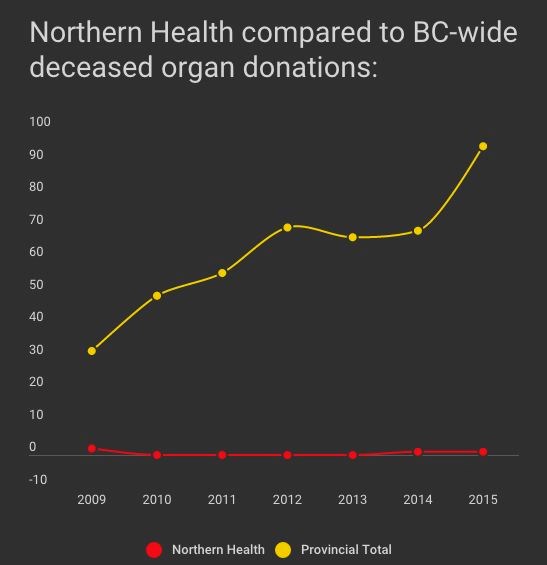While B.C.'s deceased organ donation rates have seen a steady rise in the last seven years, donors from the north have sat at either one or zero donations annually since 2009.
Last week BC Transplant released numbers it said show a "dramatic, six-year surge" bringing the 2015 total to 95 donors, tripling the 2009 rate.
For the last two years, Northern Health has had one organ donor, following three years of none.
The north has a disadvantage over other regions, said Ed Ferre, BC Transplant's provincial operations director.
"The other health authorities all have major centres with neuroservices, or several hospitals with neuroservices," he said.
"One of the problems is that the type of injuries that lead to organ donation usually involve a significant head injury, so this requires the patient to be ventilated and for a facility to have appropriate medical staff and diagnostic facilities to diagnose either neurological death or to determine that nothing more can be done for the individual and the move should be to comfort care," he said, so they might be transferred to another health authority that has neurosurgery.
Other facilities have an in-hospital BC Transplant coordinator, which they could consider in the future. For now, it offers 24-hour call support and has sent staff up when a donor is identified.
"If we have a critical mass we may look at embedding someone at least part time who's part of the facility there who can work in concert with our physician champion to help keep administration engaged and health care professionals engaged," said Ferre, adding the north used to have better numbers.
"I know that years ago when Prince George did have a neurosurgeon, we did have quite a few donors come out of Prince George, but since those days there have been a few but not as many."
Living donation remains the most common form with 113 province-wide, but 2015's uptick brought deceased donation to a more equal footing.
Last year, 21 people in B.C. died while waiting on a transplant list and there are more than 500 on the waitlist.
It's likely some northerners die while in other facilities, but BC Transplant doesn't yet track whether they become organ donors though they are looking into it.
"We're looking at originating hospital," he said. "We might identify a number of them that were transferred from Prince George, but it's hard to drill down into that."
Ferre said for a little over a year the organization has been working with a "physician champion" in Prince George, Dr. Fareen Din, and in the fall brought staff up to work on training and education.
"That's one of the things that I think will hopefully see an increase in the number of organ donors out of the north."
But that doesn't mean the north isn't benefiting from that provincial donor surge, which translated to 422 transplants in 2015.
"It's a record number. Last year there were 14 people from Northern Health who received transplants," Ferre said.
BC Transplant is following 173 organ transplant patients in the north, 92 of which are treated through Northern Health's kidney clinic in Prince George.
Northern Health said BC Transplant, run by the Provincial Health Services Authority, takes the lead when it comes to organ donations and it acts as a liaison.
"The role of the health authority here is in the identification and referral of potential donors and policy and process areas that would support organ donation," said Northern Health spokesman Jonathon Dyck.
Din, a critical care physician who could not be reached for comment, is BC Transplant's contact at the University Hospital of Northern B.C.
"He works closely in the identification and ongoing medical management of potential donors so if there is someone who does wish to be a donor Dr. Din would work with that individual and their families and BC Transplant staff on the unit where the patient is to identify how best to go about that," said Dyck.
They key is to get a team in place, including people that can recognize who might be a organ donation candidate before the family is approached.
"If the person is appropriate then we can have more of a team approach on who best should talk to the family, who has the relationships with the family and who can provide the best family and patient care," Ferre said.
B.C. is now ahead of the national average for donations when it used to be far behind, said Ferre.
"Now in 2015 we had a deceased donor rate 20.2 (per million) which exceeds the national quite significantly which is 16... We've moved the yardstick a pretty good distance," Ferre said. "We've really developed a systems approach to this. We recognize the need to engage the critical care community, we recognize the need to engage the public."
Ferre said last year it ran a successful pilot project to sign up donors with their drivers licenses, through 62 Service BC offices, and now it's moving to offer something similar with ICBC. People can also register online at BC Transplant or by calling 1-800-663-6189.
"Starting next month we'll be piloting with ICBC offices," said Ferre, which will be in four locations: Abbotsford, Kelowna, North Vancouver and Vancouver.
"What they do is provide info to people about organ donation and give them the means to access the registry."



